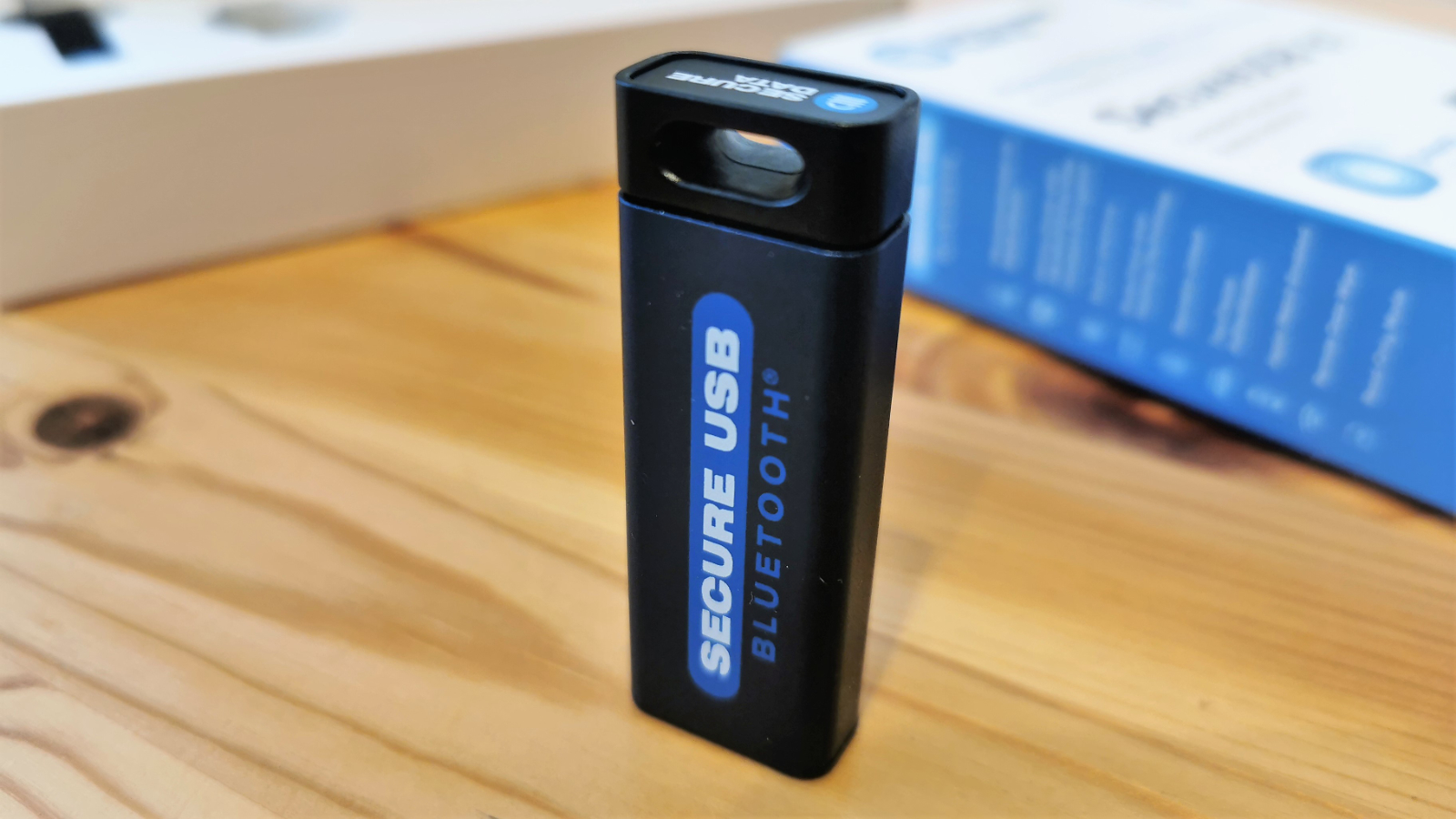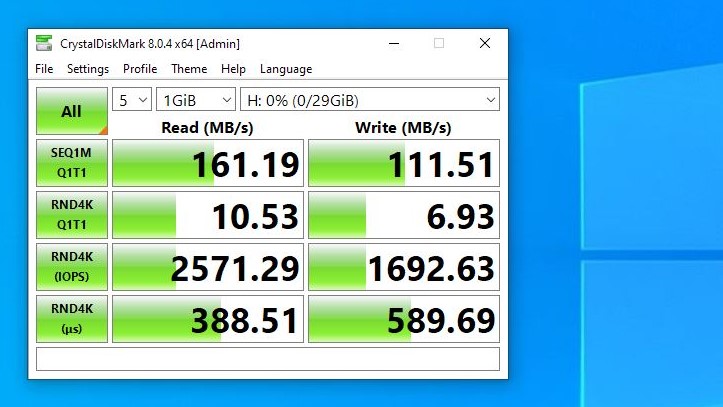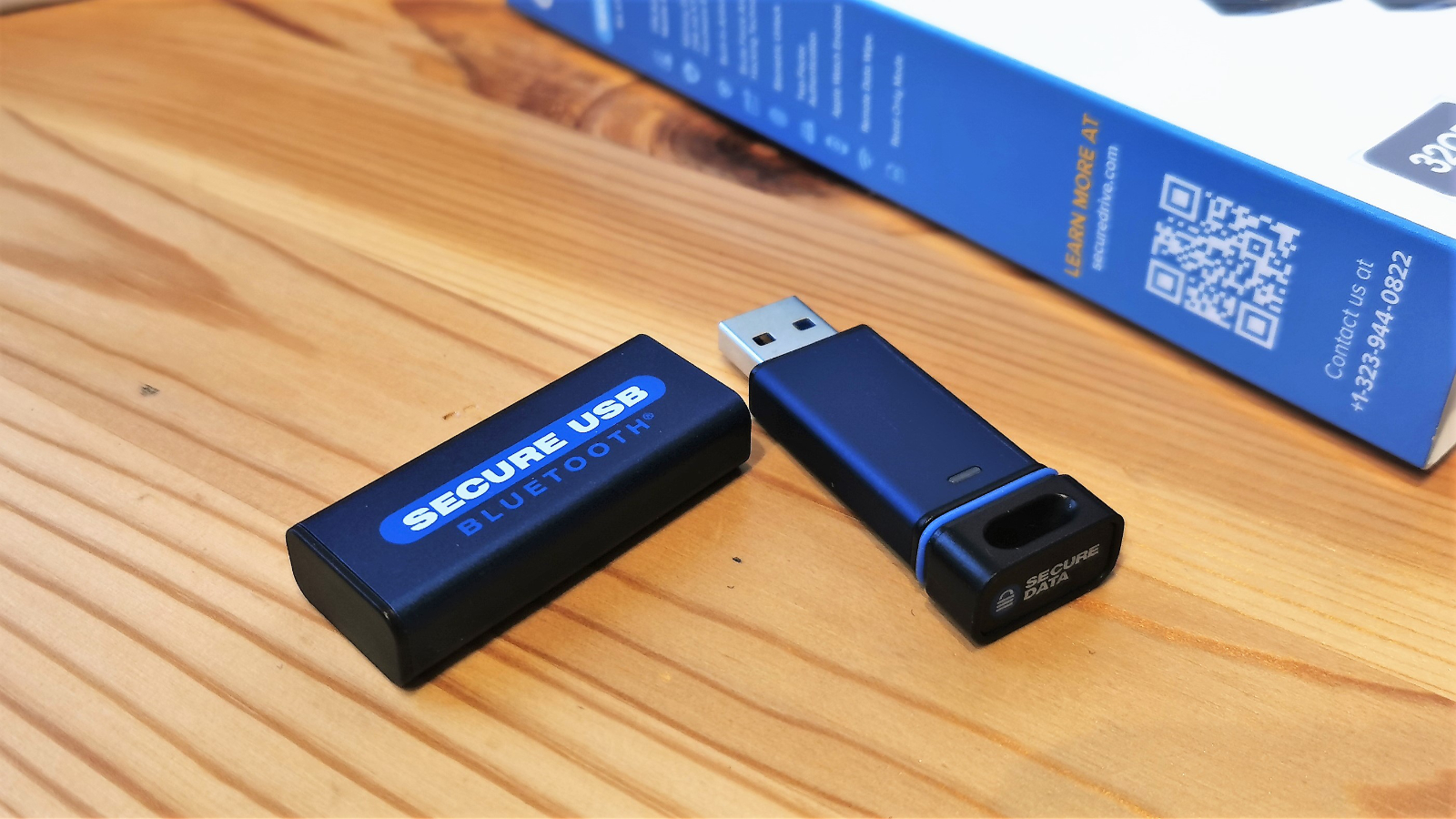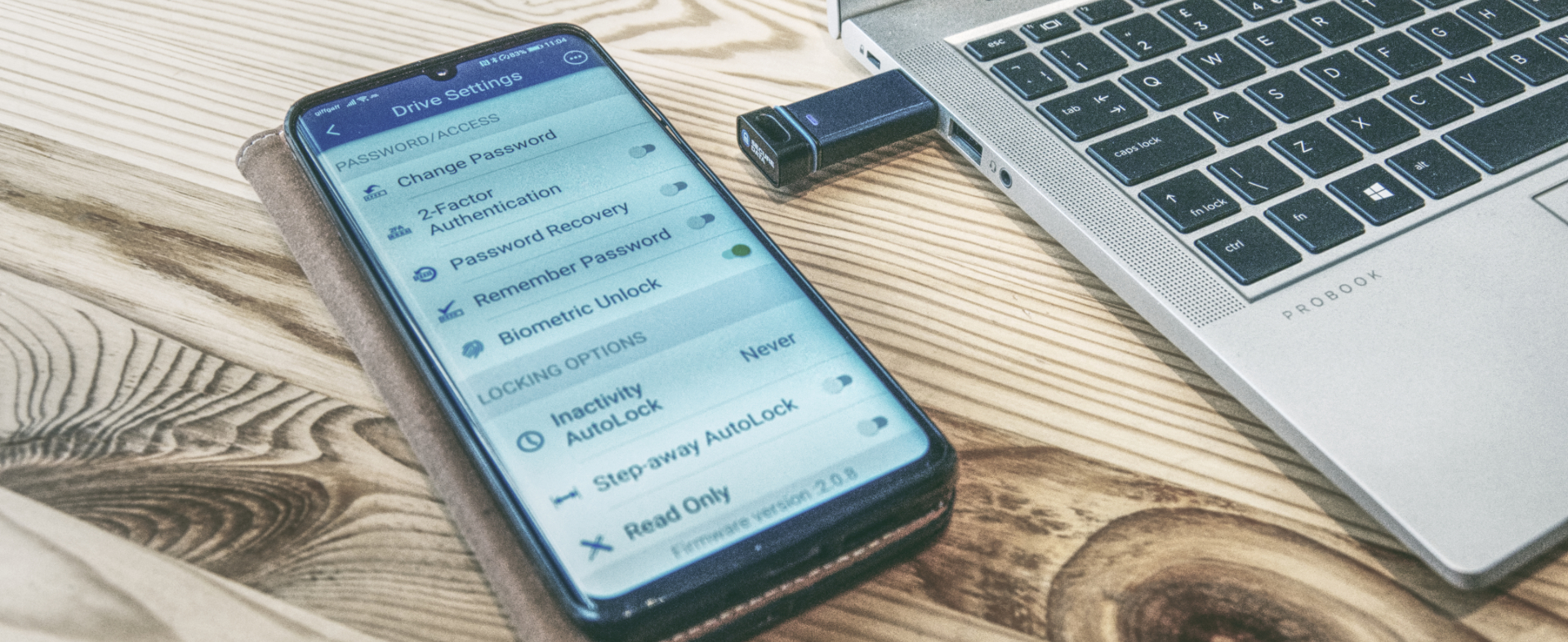TechRadar Verdict
While the technology in the SecureUSB BT works well and is a major improvement over keypads and other password mechanisms, we’re unsure who might want 8 or 16GB of encrypted space at such a high price.
Pros
- +
Encrypted storage without local software installs
- +
Easy to use
- +
System/OS agnostic
- +
Meets GDP, PHI, CMMC, PII requirements
Cons
- -
Expensive
- -
Limited capacities
Why you can trust TechRadar
SecureData grabbed our attention back in 2018 when they launched the SecureDrive BT, an external drive that encrypted storage that was unlockable via Bluetooth technology.
Alongside those designs that used HDD and SSD storage, SecureData designers also incorporated the same technology but in a USB flash drive form factor with the SecureUSB BT.
Is this just a more convenient package with smaller capacities, or has the SecureUSB BT got more to offer?
Price and availability
The SecureData SecureUSB BT comes in five sizes, 8GB, 16GB, 32GB, 64GB and 128GB. Direct from SecureData, these cost £72.60, £79.93, £101.93, £131.27, and £160.60 respectively. As the drives get bigger, their cost increases aren’t consistent, though the cost per GB is much more acceptable for the larger drives.
- Also check out our roundup of the best external hard drives

Design and features
The basic design of USB keys hasn’t substantially changed from when they first appeared in the 1990s, and SecureData hasn’t broken any new ground with the SecureUSB BT.
It’s a rectangular key that comes with a protective metal cover that stops dust and liquid from getting to the exposed USB blade and internal electronics.
At the opposite end to the blade is a hole to attach the drive to a lanyard, or included in the box is a wrist strap.
Along with the strap are two high-quality USB adapters that allow the SecureUSB BT to be connected to a mobile phone, either Micro-B or USB-C.
What’s mildly annoying is that the sleeve doesn’t connect to the drive once it is removed, encouraging it to be lost, and the USB adapters have no natural home other than the product box. A pouch to store these things might have been a good option.
That said, you only need the USB adapters once when you pair the SecureUSB BT to the phone, so they could probably go back to the box if you don’t misplace that.
This solution works intrinsically the same as the SecureDrive BT before it, where the drives are paired with a mobile device that is then used to unlock it.
As methodologies go, this is an elegant one, as it enables the storage to be unlocked on any computer without the need to install a decryption utility on that machine. Without the need for local software or drivers, the SecureUSB BT is OS-agnostic, as long as that operating system can understand the file system that the SecureUSB BT is formatted with.

In use
Once the SecureData User application is installed on the phone or tablet, the SecureUSB BT can be connected to be paired with that device.
There is a default password that you must change on first use, and you can then set the drive to unlocked by that password, or biometrically if the mobile device supports that, or even via two-factor authentication.
In short, precisely how secure you wish to make the drive is up to you.
But, it is worth noting that without the password or biometric unlocking the contents of the drive are encrypted forevermore. There is no backdoor way to unlock it for those who forget, and repeated attempts with the wrong password or some other brute force methodology will result in the erasure of all the contents.

As a separately charged service from SecureData, it is possible to remotely wipe the contents of the SecureUSB BT, but only at the point that it is connected to the unlock application.
An administrative tool can also be used to manage many drives for those companies that need to keep tight control of them and who can unlock them.
Overall, the SecureUSB BT does what many encrypted drives achieve, but it avoids the obvious limitations of keypads and other on-device mechanisms.

Hardware and performance
The hardware in this device has two parts that make up the security functionality and the storage.
There seems little revolutionary about the NAND flash memory parts as they’re very much the same as you might find in good quality branded parts sold as USB 3.0 compliant.
In our benchmarking, it managed acceptable 161MB/s reads and 11MB/s write speeds.
These scores compare badly with external NVMe-based SSD, where transfer speeds of 1,000MB’s and a capacity of 1TB are commonly available for the price of a 128GB SecureUSB BT.
But, those products generally aren’t protected by the security mechanisms that SecureData included here, even if many of them can be AES hardware encrypted.
Where the memory is decidedly run-of-the-mill, the secure side is much more impressive. It is FIPS 140-2 Level 3 validated, uses AES-256Bit XTS hardware encryption and incorporates triggers that will detect brute-force entry attempts and initiate a software self-destruct of the data.
Not that the drive will emit a puff of smoke Mission Impossible-style, but the contents with be deleted with no chance of ever being resurrected.
Here’s how the SecureData SecureUSB BT performed in our suite of benchmark tests:
CrystalDiskMark: 161MBps (read); 111MBps (write)
ATTO: 157.46MBps (read, 256mb); 47.91MBps (write, 256mb)
AS SSD: 158.87MBps (seq read); 101.82MBps (seq write)
AJA: 156MBps (read); 47MBps (write)
Timed limits for inactivity can also be set so that the drive locks itself after a predetermined period of inactivity, reducing the possibility of a system being available to others with an unlocked SecureUSB BT attached to it.
And, if you take your phone with you on that comfort break, once the phone is 10ft away from the SecureUSB BT, it will automatically lock.
For those businesses heavily invested in security that want the administration service, extra safeguards are available such as time and geofence limits on when and where the drive will unlock. Admins can also remote unlock, deny access and even wipe the drive.
Overall, this device can be made more secure than most legal businesses would reasonably need or want to manage.
The competition
When considering secure storage, the competitor that springs most readily to mind is iStorage and its DATASHUR BT range.
This product uses a similar mechanism that leverages Bluetooth to unlock an encrypted flash drive via a mobile phone application.
Pricing of the DATASHUR BT is £79, £99, £109 and £139 for the 16GB, 32GB, 64GB and 128GB options. That makes it a good bit cheaper than the SecureUSB BT product for the same capacities.
If 128GB isn’t enough capacity for your needs, Western Digital has recently added the G-DRIVE ArmorLock SSD to its product range that also uses mobile device biometrics and 256-bit AES-XT to secure the contents.
The G-DRIVE ArmorLock SSD comes in 1TB, 2TB and 4TB for £200.99, £340.99 and £700.99, respectively. And with USB 3.2 Gen 2 connection can deliver 1,000MB/s of reading and writing performance.
But, the ArmorLock products don't offer FIPS 140-2 Level 3 validation, making them less secure even if the cost of drive space represents much better value.

Final verdict
The SecureUSB BT is one of the better secure flash drive technologies we’ve seen, and it makes working with an encrypted device straightforward.
Its ability to be taken to a client’s location and then decrypted without installing files on the remote system is an elegant design that makes it highly practical for those who need to share sensitive data with others.
What we’re less impressed with are the available capacities - especially why SecureData even bothered with the 8GB and 16GB drives, and surely a 256GB and 512GB should be easily possible in this form factor?
It isn’t surprising that the prices are inflated above what ordinary devices cost, but it's how much more is a concern. A typical 128GB flash drive with similar performance, like the SanDisk Ultra Flair 128 GB, costs about £15.99. And, the 512GB model of that drive is cheaper than the 8GB SecureUSB BT, at just £59.99.
Anything with the word ‘Secure’ attached to it is generally marked up in price, but even by those standards, the SecureUSB BT is expensive.
For the biggest 128GB capacity, SecureUSB BT is 15% more expensive than the iStorage DATASHUR BT. And, at the review capacity of 32GB, it's 29% more costly.
We can’t argue about the merits of the security models each of these products has, but purely from a value for money position, the SecureUSB BT needs to cost less and perform better at transfers.
- We've also highlighted the best portable SSD
Mark is an expert on 3D printers, drones and phones. He also covers storage, including SSDs, NAS drives and portable hard drives. He started writing in 1986 and has contributed to MicroMart, PC Format, 3D World, among others.

